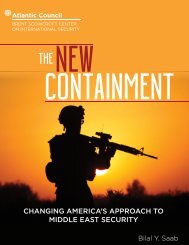POLITICS GOVERNANCE STATE-SOCIETY RELATIONS
Politics_Governance_and_State-Society_Relations_web_1121
Politics_Governance_and_State-Society_Relations_web_1121
Create successful ePaper yourself
Turn your PDF publications into a flip-book with our unique Google optimized e-Paper software.
<strong>POLITICS</strong>, <strong>GOVERNANCE</strong>, AND <strong>STATE</strong>-<strong>SOCIETY</strong> <strong>RELATIONS</strong><br />
work also mean delaying or denying opportunities<br />
for marriage, family formation, and the ability to<br />
shape their own future—creating what Brookings<br />
scholars in the mid-2000s called a “generation in<br />
waiting.” 41 To overcome this challenge requires far<br />
more than creating new jobs or enabling youth to<br />
start small businesses. It requires recognizing the<br />
transformation in mentality that young people<br />
in the Middle East have undergone over the past<br />
generation, and enabling young Arabs to be the<br />
authors of their own stories, defining and realizing<br />
their own visions for themselves and for their<br />
communities. If governments fail to do this, they<br />
should not be surprised when extremist actors<br />
that do offer young people a sense of agency find<br />
success in recruiting.<br />
Harnessing this powerful potential on behalf of the<br />
community requires integrating young people into<br />
every dimension of community<br />
life—the economy, but also civil<br />
society and government. There<br />
are formal ways to do this—for<br />
example, establishing quotas for<br />
youth in parliaments or parties—<br />
and less formal ways, such as<br />
embracing youth-focused civil<br />
society engagement. The United<br />
Arab Emirates has gone so far as<br />
to appoint a minister for youth<br />
who is herself only twenty-two<br />
years old. The symbolism is<br />
valuable; even more so will be<br />
seeing her exercise authority<br />
and resources on behalf of<br />
her mandate. As with all these<br />
recommendations, the specifics of implementation<br />
are best left to local negotiation and agreement.<br />
The imperative is to take the need for youth<br />
inclusion seriously as an essential prerequisite for<br />
effective governance.<br />
Cultivate platforms and skills for dialogue and<br />
conflict resolution.<br />
The Tunisian constitution might never have<br />
been concluded if it had been left entirely to the<br />
politicians. Throughout the period of constitution<br />
drafting, tensions between secular and religious<br />
parties were growing, inside parliament and out,<br />
exacerbated by violent attacks by extremists<br />
that included two political assassinations. More<br />
than once, the constituent assembly seemed<br />
The imperative<br />
is to take the<br />
need for youth<br />
inclusion seriously<br />
as an essential<br />
prerequisite<br />
for effective<br />
governance.<br />
at loggerheads on key issues. Ultimately, these<br />
obstacles were overcome not in the negotiating<br />
room but in two other key locales: in the assembly’s<br />
cafeteria, where representatives often met for<br />
informal conversation, and in dialogues and townhall<br />
meetings organized by local civic groups. As<br />
the 2015 Nobel Peace Prize to the Tunisian National<br />
Dialogue Quartet attests, these civic spaces for<br />
dialogue and open debate on constitutional issues<br />
helped urge representatives toward a successful<br />
conclusion and improve mutual understanding<br />
sufficiently to enable compromise. 42<br />
By contrast, in Egypt, both the Muslim Brotherhood<br />
and its opponents engaged in zero-sum politics,<br />
acting in the apparent belief that electoral victory<br />
granted the right to rule unconstrained, and that any<br />
given contest’s outcome spelled ultimate victory or<br />
defeat (this latter view, given that Egypt’s transition<br />
plan prioritized elections over<br />
constitution writing, was not<br />
irrational). The polarization in<br />
Egypt today, whereby political<br />
opposition is essentially<br />
criminalized and opponents<br />
deem the government entirely<br />
illegitimate, is an outgrowth of<br />
this earlier period of zero-sum<br />
politics.<br />
The societies of the Arab world<br />
must resolve fundamental<br />
issues: whom does government<br />
represent, and how? What<br />
should be the role of religion<br />
in politics? What role should<br />
the state have in the economy? What should be<br />
the relationship between civilian leaders and the<br />
military? Without arenas and skills to debate and<br />
resolve these questions, stable and consensual<br />
governance simply cannot emerge from such a<br />
polorized environment. This is even more the case<br />
in states emerging from conflict, where citizens are<br />
negotiating new rules for governance. In states with<br />
new, fragile political institutions, it is crucial that<br />
societies have places where divergent views can be<br />
aired and exchanged peacefully. In a region where<br />
extremists seek to exploit fractures within societies,<br />
to recruit adherents, to carry out violence, and to<br />
undermine existing states, it is important for all<br />
societies to build their resilience against extremism<br />
by building their capacity for peaceful resolution<br />
41 Navtej Dhillon and Tarik Yousef, Generation in Waiting: The<br />
Unfulfilled Promise of Young People in the Middle East<br />
(Washington, DC: The Brookings Institution Press, 2009).<br />
42 “The Nobel Peace Prize for 2015,” Nobelprize.org, October<br />
10, 2015, http://www.nobelprize.org/nobel_prizes/peace/<br />
laureates/2015/press.html.<br />
ATLANTIC COUNCIL<br />
31



